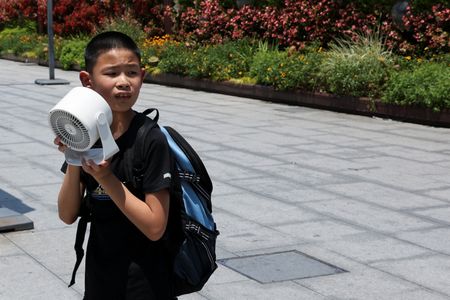By Laurie Chen
BEIJING (Reuters) -Police in China have detained dozens of young women authors in a genre of gay erotica widely known in Asia as “boys’ love” during a nationwide crackdown on online pornography, lawyers and activists familiar with the cases say.
The detentions since March have triggered debate on social media about the limits of free speech and the apparent sexist nature of the crackdown, while stirring sympathy for the authors, many of whom hail from low-income backgrounds.
“I just wanted to earn some money to ease my family’s financial burden,” one author of such works wrote in a May 25 post on microblogging platform Weibo before it was deleted.
“I never imagined that 300,000 clicks and 4,000 yuan in royalties accumulated by those obscure words over time would become criminal evidence,” she added, referring to a sum equivalent to about $560.
Police detained the women in the northwestern city of Lanzhou for violating a 2004 obscenity law that can carry jail terms of more than 10 years or life, though legal scholars want it overhauled to reflect changes in internet usage.
The writers, all aged in their 20s and early 30s, published their work on Haitang Literature City, a niche pay-to-read online platform specialising in the erotic fiction genre, popular with women, that features relationships between men.
The website is censored in China and can only be accessed by using virtual private network (VPN) software.
One author detained in April earned royalties of less than 10,000 yuan ($1,400) that supplemented her income from a series of menial jobs, said her defence lawyer, who sought anonymity for fear of police retaliation.
“In a country that emphasises socialist morality, people’s concept of sex is influenced by the prevailing culture, so of course it is linked to freedom of speech,” the lawyer said.
“If these things cannot be written now, wasn’t ‘Dream of the Red Chamber’ also obscene at the time?” they asked, referring to a famous 18th-century Chinese novel.
Some authors may face trial as soon as this autumn if prosecutors decide to press charges, the lawyer added.
Lanzhou police did not reply to a request for comment.
In 2021, China’s state media regulator called for the removal of content depicting “abnormal sexual relationships”, a year after the official People’s Daily condemned boys’ love novels as “poison” that could “mislead young people on gender”.
Reuters was unable to confirm the number of women detained, although lawyers say some were later released on bail. None could be reached for interviews and family members declined to speak, citing safety threats.
In recent weeks, several have written social media posts about their experiences, only for these to be deleted later.
One described being detained by police in front of her university classmates. Others said police interrogated them about their sex lives and sexual orientation.
More than a dozen Chinese lawyers have publicly offered pro bono aid to authors and Haitang readers summoned by police.
China cracks down periodically on content it deems “immoral”, ranging from LGBT-themed social media accounts to “vulgar” livestreamers and influencers who “flaunt wealth”.
A crackdown on gay erotica last year saw more than 50 Haitang authors detained or fined by rural police in the eastern province of Anhui, according to lawyers.
One well-known author was jailed in December for 4-1/2 years for earning 1.8 million yuan ($250,000) by publishing “obscene works”, a court judgment posted online by her husband showed. The user did not respond to a request for comment.
But the latest group of detained authors made just a few thousand yuan from their work, said an activist familiar with several cases who declined to be identified for safety reasons.
In informal conversations, the defence lawyer said, Lanzhou court officials have called the stories “disgusting and perverted” for their depiction of LGBT relationships.
“These websites are extremely niche and can only be accessed by insiders, whereas vulgar online content involving gambling, porn and minors is everywhere on short-video apps and social media,” one user wrote on the RedNote platform.
Its “Haitang” hashtag drew more than 205 million views and 1.8 million posts before it was censored in June.
“Men who write pornographic fiction enter the China Writers’ Association, whereas women who do the same go to jail,” runs a popular RedNote meme.
Many users said some perpetrators of rape, molestation and domestic violence received lighter sentences than writers of erotica.
“An authoritarian government can only use a one-size-fits-all approach to arrest authors,” feminist activist Li Maizi said of the anti-pornography campaign.
“They should implement a rating system to protect these creators rather than simply erasing them.”
($1=7.1792 Chinese yuan renminbi)
(Reporting by Laurie Chen; Additional reporting by Larissa Liao; Editing by Clarence Fernandez)






